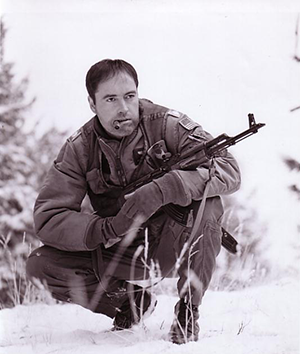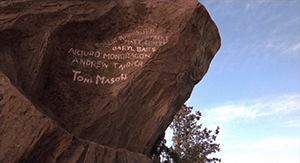 Powers Boothe died, and I grieved somewhat. CNN wanted me to remember him for—and they’ll burn in hell for this—”Agents of S.U.C.K.”.
Powers Boothe died, and I grieved somewhat. CNN wanted me to remember him for—and they’ll burn in hell for this—”Agents of S.U.C.K.”.
You soulless bastards.
Me? I’ll always remember Powers Boothe as Curly Bill Brocious, from 1993’s Tombstone. He was utterly perfect in that movie—at times expansive and friendly, yet at others operatically cruel and vengeful. Powers Boothe had gravitas, he had presence, he had power. (No pun intended.)
And yet, as phenomenal as that movie was—and it was—and as phenomenal as he was in it—and he was—that wasn’t Boothe’s best role. For me, that will always be Lt. Col. Andrew “Andy” Tanner, in 1984’s legendary Cold War invasion pic, Red Dawn.
An Eagle driver—for the plebs in the audience, that means he’s the pilot of a McDonnell Douglas F-15 Eagle air superiority fighter—Col. Tanner was shot down over Colorado during the invasion of the United States by a Russian-Cuban-Nicaraguan Communist alliance. Think of it as an alternate history where, in the wake of Vietnam, anti-war Democrats succeeded in gelding the great US military machine, leaving us vulnerable to foreign subversion, infiltration, and eventually invasion.
But honestly, the politics are irrelevant. It’s stage dressing, a flimsy justification to tell a stark and chilling tale about Colorado high school kids caught behind enemy lines, forced to live off the land while their hometown is occupied by foreign invaders who’ve shot friends and family, and who rule with cruelty and ruthlessness. Drawn into fighting by accident, forced to defend themselves against the Communist forces, they use their skills at hunting and stalking to strike back at the invaders.
And they ABSOLUTELY KICK ASS.
They shoot up convoys, raid outposts, and stage ambushes, small and large. They bomb the local “We Russian Communists Love Our American Comrades So, So Much That We’re Here to Free You From Servitude” center, then stage a breakout from a re-education camp. They kill Russians, Cubans, and Nicaraguans and even, in one especially wrenching scene, one of their own who’d sold them out. Their battlecry—“Wolverines!”, after their local high school mascot—becomes a rallying cry for others. They inspire people.
Under the pressure of the invasion, and reprisals against their families and neighbors, some of the kids become cold and vengeful, some rise to the occasion, and some crumble under the pressure, but ultimately they’re just normal kids, cut off and alone, fighting desperately to free their hometown from the invaders.
The movie has a truly bittersweet ending. Pushed to utter desperation after several of their number are slain by Soviet forces, they stage a final attack on the local Communist military headquarters, during which some of them escape but some do not.
 The movie closes with a shot of a boulder, into which the teens had carved the names of their dead. It’s after the war, the US has won, and the place has been made into a war memorial, “Partisan Rock”. The plaque reads: “In the early days of World War III, guerrillas—mostly children—placed the names of their lost upon this rock. They fought here alone and gave up their lives, so that this nation should not perish from the earth.”
The movie closes with a shot of a boulder, into which the teens had carved the names of their dead. It’s after the war, the US has won, and the place has been made into a war memorial, “Partisan Rock”. The plaque reads: “In the early days of World War III, guerrillas—mostly children—placed the names of their lost upon this rock. They fought here alone and gave up their lives, so that this nation should not perish from the earth.”
The movie isn’t really about Communists, or the Cold War, or World War 3. It’s about patriotism, love of country, about fighting for your family, home, and country, about giving your life to help protect and preserve her. It’s about fighting for your rights and freedoms, in the face of overwhelming opposition. It’s about enduring privation and suffering, and children being forced to become adults through those experiences.
Powers Boothe’s character came into the group as an outsider, an adult, a military veteran who taught the kids the essentials of fighting a war, rather than just hunting men. He became an advisor, a trainer, a surrogate father, and died saving the lives of his charges. And, as was his wont, Boothe stole every single scene he was in.
We’re a pampered and wealthy people, a people so wealthy we’re going insane from the surfeit. It’s good for us to be reminded that life can be harsh and wrenching sometimes, that wealth and ease aren’t rights, but rather blessings, and that many times, many of us have had to suffer and die to secure those blessings.
I love Red Dawn, because I love my country and I’m eager to induct those who attack her into Club Afterlife. Plus, playing war is cool. If pretending to shoot imaginary bad guys is wrong, I NEVER WANT TO BE RIGHT.
Red Dawn mixed shocking images of the invasion of our own country with the wish-fulfillment of killing those self-same invaders. And Powers Boothe, though not playing one of the main characters, sold his role with his customary conviction and gravitas, and made the movie all the better for his presence.
Rest in peace, good sir. You will be missed.
Jasyn Jones, better known as Daddy Warpig, is a host on the Geek Gab podcast, a regular on the Superversive SF livestreams, and blogs at Daddy Warpig’s House of Geekery. Check him out on Twitter.
“Because we live here!”
Well…bye.
RIP.
Those cajuns tracked you down after all, Hardin.
Rest in piece, sir.
I will admit that despite being a massive John Milius fan (a hardcore right-winger who was best friends in film school with Spielberg, Coppola, and Lucas and said to be as good as or better than any of them, but was blackballed by Hollywood for his beliefs), I dislike this movie.
But yes, I would much rather remember Powers Boothe from that (his performance was good) than freaking “The Avengers”.
Powers Boothe was unusual in that he played bad guys and good guys with equal aplomb. He also was able to turn the character volume up or down, depending on the role, something that many actors are incapable of doing.
My favorite Boothe role was that of the father of the boy kidnapped by Indians in The Emerald Forest. I just looked at the chronology, and it was only one year after Red Dawn. “Bill Markham” is not a tough guy or wise guy in the film. Rather, it’s a relatively restrained performance that nevertheless tracks an obsession – an obsession fueled by love.
As some of you may know, his first major role was playing Jim Jones.
Boothe was a badass. He even played an actual pulp protagonist in “Philip Marlowe, Private Detective.”
-
Phillip Marlowe is the first role I saw him in and still my favorite. Just perfect.
-
Damn, he was good in that.
RIP Mr. Boothe.
Think of it as an alternate history where, in the wake of Vietnam, anti-war Democrats succeeded in gelding the great US military machine, leaving us vulnerable to foreign subversion, infiltration, and eventually invasion.
That’s some interesting head-canon. It’s worth noting that the movie was filmed and set during the Regan years and at a peak in Defense spending. They explain the geo-political causes that led to the invasion during the open sequence.
For me, of the movies that I loved pre-adulthood, Red Dawn is the one that is the most different when I watch it now.
In 1984, it was an action movie about kids like me fighting commies. Just as awesome as Rambo, but more identifiable.
Now it’s a movie about how war destroys innocence on both sides. Most poignant is are the scene with the Cuban commander.
In any case, you are right about Booth. He stole the show.
“By Dawn’s Early Light” an old HBO movie is also worth watching.
As a fan of Mr Boothe I can only add Amen. But I protest the dig at Agents of Shield. The show has improved significantly over its run and its fourth season, which is ending this week, has been fun.
Another great role was opposite Nick Nolte in Extreme Prejudice.
One of my favourites.
John Milius Directed and co-wrote Red Dawn.
He also directed and Co-Wrote Conan the Barbarian (I am of the mind that although that Conan is not REH’s Conan it is still a great film, Snow tempered cast Iron sword, Kull villain, Crom prayer, origin story and all) and Co-Wrote Apocalypse Now.
He also wrote Jeremiah Johnson.
His last big project was as co-creator of HBO’s Rome.
The guy made some stuff that compared to everything else being made is really against the headwind. Not just politically but culturally as well. His characters their motivations and plots depict men who come from a different age.
-
And he also wrote and directed The Wind And The Lion, a wonderfully entertaining flick.
Red Dawn’s composer was the same as Conan and Blue Lagoon–Basil Poledouris.
What strikes me is how he and JT Walsh conveyed a stong masculinity indeed a low key charismatic virility.and this mascilinity was consistentvwhether they played good or bad guys. So the questoon why were tgey able to convey this masculinity and how can it be recaptured or encouraged again?
xavier